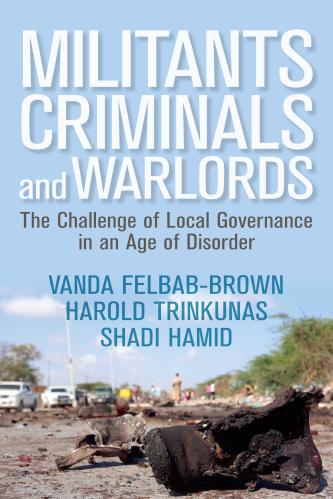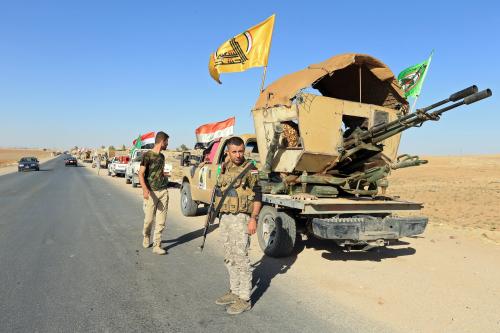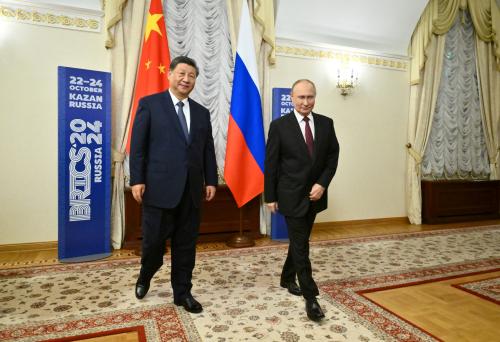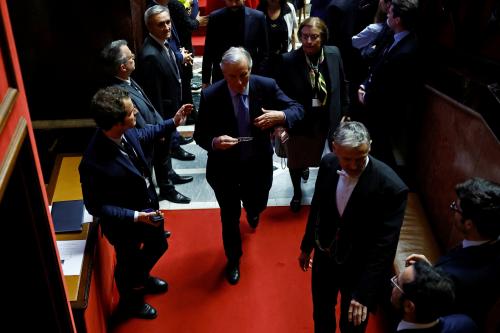Militia groups in the Middle East can threaten local governance and regional stability. After the Islamic State (ISIS) lost territorial control in Iraq, for example, paramilitary groups have sometimes filled the vacuum, capitalizing on the very conditions of bad governance that helped usher ISIS to power and continue to hinder stability in the region.
On June 28, Brookings Senior Fellows Shadi Hamid and Vanda Felbab-Brown offered insights into the complex role that militias play in countries with ineffective, fragile governments. Stanford University Professor Paul Wise and Brookings Visiting Fellow Jeffrey Feltman discussed the challenges of providing humanitarian aid, as well as the complications around international engagement with militias. Senior Fellow Suzanne Maloney moderated the panel.
Why it’s all about governance
https://www.youtube.com/watch?v=5JZqeo7m6Cs?start=494
As Felbab-Brown explains in a new policy brief based on field research in Iraq, an estimated 150,000 militiamen are currently mobilized in the country. She argues that some of them pose various threats to the Iraqi state and society, with some fueling sectarianism and political repression. At the event, Felbab-Brown explained how some of the paramilitary groups engage in “systematic silencing,” “economic distortion,” and “outright mafia-like practices of extortion,” allowing militias to build “enormous political capital” and infiltrate state institutions While the chances of militias toppling the Iraqi state are slim, she contended that in a country where they are “overwhelmingly seen as heroes” by the public, some, particularly those closely aligned with Iraqi politicians and supported by Iran, have captured the Iraqi state from within.
Hamid explained that the rise of groups like ISIS in Iraq and Syria, countries riddled by civil war, is ultimately due to underlying conditions of bad governance and the militias’ ability to present themselves as “an alternative to worse alternatives.” Iraq’s post-civil war climate created a vacuum for ISIS and militias to capitalize upon. Non-state actors thrive in spaces where citizens’ basic needs are met with “bad governance, failed governance, or no governance,” he said.
Hamid shed light on how ISIS’ intent to implement an extreme version Shariah law in its territories led to the establishment of “fairly elaborate legal and institutional structures,” which provided Iraqis and Syrians with legal services, local courts, and dispute mechanisms that were often absent under deeply corrupt and inefficient governments. When “the bar is so low,” these non-state actors do not need to provide good governance but merely “good enough governance” to gain local support from citizens who may otherwise detest the ideology of extremist groups like ISIS but still may prefer it to the other available options of complete chaos, the absence of basic services, or sectarian abuse from their governments, he said. Even in Afghanistan, added Felbab-Brown, where the Taliban was a poor ruler during the 1990s, Afghans preferred the Taliban’s “predictable brutality” to the government’s “unpredictable brutality” that came with civil war and abuse.
Challenges for international humanitarian organizations
https://www.youtube.com/watch?v=5JZqeo7m6Cs?start=1949
Bad governance affects how international organizations operate, as well. If the state fails to protect the rule of law and ensure stability, Wise said, humanitarian organizations face the dual task of protecting and providing for civilian populations.
He explained that during the 2016-17 Battle of Mosul—one of the worst urban battles since World War II—the World Health Organization opted to functionally embed medical personnel within Iraq’s Counterterrorism Service in order to ensure the quickest response. (This, despite resistance from Doctors Without Borders and the International Committee of the Red Cross.) Wise reflected: “They did save lives—but there is no consensus about how the humanitarian world needs to respond to trauma requirements,” calling attention to a new “humanitarian impulse” that is “fundamentally incompatible with traditional humanitarian strategies.”
Militias also complicate the United Nations’ political engagement with non-state armed groups. Feltman, former under-secretary-general for political affairs, highlighted that “there is no parallel guidance or mandate in general for how you politically deal with groups if you’re a United Nations official,” due to opposition from member states themselves. While the Secretariat asserts the right to talk to any and all relevant parties in order to “manage, reduce, and resolve conflict,” doing so remains much more difficult in practice.
Feltman spoke of three cases—Libya, Syria, and Yemen—that exemplify the difficulty of dealing with militias. All three governments are “legitimate”—represented in the U.N. General Assembly, for example—yet do not maintain a monopoly on power within their respective territories. As a U.N. envoy, engaging with non-state actors in each specific case comes with a difficult dilemma: “Are you weakening the groups that are striving for a peaceful solution by engaging with armed groups?”
Current policy limitations
https://www.youtube.com/watch?v=5JZqeo7m6Cs?start=3193
While it may be all about governance, the panelists were quick to note that certain U.S. policies—specifically regarding designating groups as “terrorist organizations”—remain counterproductive to state-building and U.S. interests. Felbab-Brown raised the case of Colombia: Because the FARC (Fuerzas Armadas Revolucionarias de Colombia)—now actively part of the political process—was once designated a terrorist group, “the U.S. cannot even buy the FARC a cup of coffee.” Felbab-Brown noted similar situations in Somalia, Nigeria, and Iraq. U.S. designation policies have created a challenge for U.N. engagement as well, but while groups like Hamas and Hezbollah appear on the U.S. terrorist organizations list, they do not on the U.N.’s. Ultimately, Feltman spoke in favor of this type of U.N. discreet engagement at the political level.
On the humanitarian front, Wise called attention to another negative policy impact—that counterterrorism laws are being applied to persecute doctors who treat patients associated with enemy fighters. Providing impartial care, he said, is ultimately “part of our medical ethics” and “a humanitarian principle.”
Looking forward
Felbab-Brown recognized the need for a carrot and stick approach towards militia groups with the goal of shaping their behavior to be consistent with a more inclusive non-sectarian accountable and effective Iraqi state, and thus also with U.S. interests—a political process that could be “sloppy,” “unpleasant,” and “frequently non-linear.” Hamid implored that to prevent history from repeating itself with the “emergence of IS[IS] 2.0,” the U.S. has no choice but to tackle governance issues head-on in the Middle East, as unpopular as this policy might be at home.
Brookings Foreign Policy research interns Nikhita Salgame and Maria Borselli contributed extensively to this article.





Commentary
Militias in the Middle East and North Africa: “It’s the governance, stupid!”
July 3, 2019